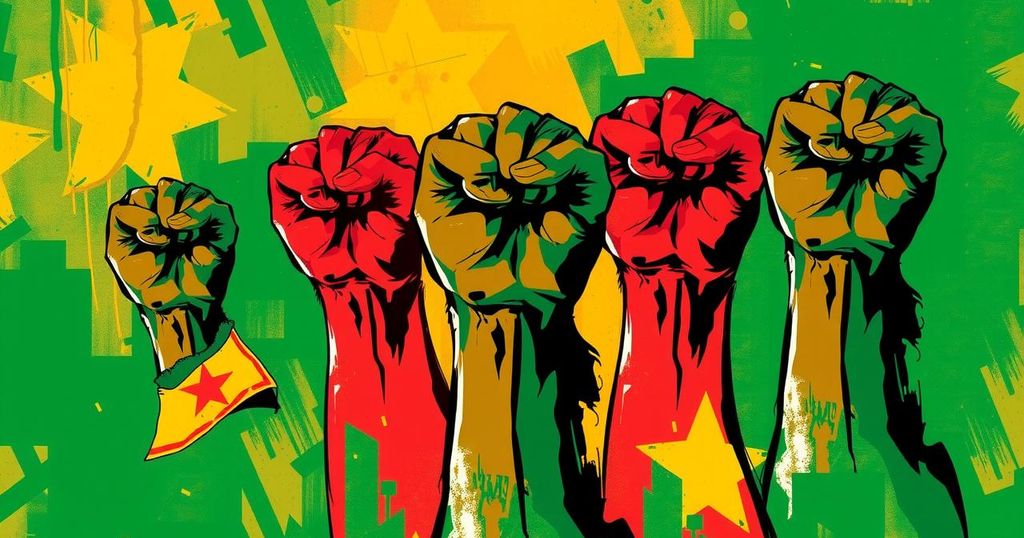Malians Protest Military Government Moves to Maintain Power

Protests erupted in Mali against military leader Colonel Assimi Goita’s moves to extend his power through 2030. Initial public support has shifted dramatically due to broken promises for elections and growing unrest against political oppression. Human rights concerns add pressure as Malians confront their leaders amid an evolving security situation.
Malian citizens are protesting against military leader Colonel Assimi Goita’s recent moves to prolong his rule, seen by many as a betrayal of initial promises. The unrest became visible on May 3 in Bamako where crowds gathered, demanding a return to democracy after Goita proposed to lead until 2030. Prior commitments for elections have faltered, igniting public fury and a call for political activity cessation by the government ahead of impending mass protests.
The public discontent is unique given that support for Colonel Goita was relatively steady until this moment. As citizens rally against the military government, one research analyst notes that this is perceived as a serious overstep, prompting Malians to re-engage in protests reminiscent of the past, where dissatisfaction with leadership had previously led to the military’s rise.
Tensions escalated further at a cultural center in Bamako as rival demonstrations took place. Supporters of the military regime confronted those protesting, escalating the risk of violence, according to a Sahel researcher. Past protests against earlier governments saw deadly crackdowns; history looms large over this new phase of civil dissent.
Colonel Goita first came to power in a coup amidst rampant insecurity in 2020, positioning himself as a deliverer of hope. However, amid unresolved threats from armed groups and deteriorating safety, Malians had supported him in the name of stability. Yet, over the last few years, the security landscape has not improved significantly and the government’s postponement of elections has intensified frustrations.
Initially seen as a visionary figure, Goita’s actions have cast doubt on his intentions. After ousting the civilian president in a second coup in May 2021, his government has extended the timeline for elections which has drawn ire from opposition parties who have faced arrests and suppression of dissent. The implications of these actions are seen as a threat to the country’s already fragile democratic fabric.
Recent public opposition signals a potential shift as citizens threaten to engage in more protests. This follows the suspension of political parties by the military government for “public order” reasons, a move many perceive as an attempt to maintain iron grip on power. Whether this backlash triggers significant changes or more severe consequences remains uncertain.
On the ground, security dynamics have shifted with the engagement of Russian Wagner mercenaries fighting alongside Malian soldiers against armed groups in the north. While some areas have seen military success, the overall situation remains unstable. Critics argue that this martial approach fails to address the systemic issues faced by civilians.
As the government claims successes, reports from human rights organizations indicate grave human rights abuses, including extrajudicial killings and targeting of vulnerable ethnic groups. Displacement is rampant as continuing violence exacerbates the humanitarian crisis. The toll on Malians, especially outside the capital, is steep, and many are calling for a reconsideration of the strictly military strategy.
The growing discontent in Mali reflects not only anger towards the current regime but also unease about the trajectory of democracy and human rights in the country. The complexities of the current political climate require careful navigation to achieve stability without perpetuating cycles of violence. As Malians gear up for potential unrest, the future echoes uncertainty amid promises broken and a deeply fractured society.
The increasing discontent among Malians with Colonel Goita’s government, once seen as a beacon of hope, unveils a critical turning point. Public protests against military leadership reflect frustration over postponed elections and a crackdown on political activities. Reports of human rights violations further signify the challenges facing civilian populations. As Malians prepare to reassert their voices against a backdrop of military control, the future remains precarious amid spiraling violence and growing calls for democratic restoration.
Original Source: www.aljazeera.com







